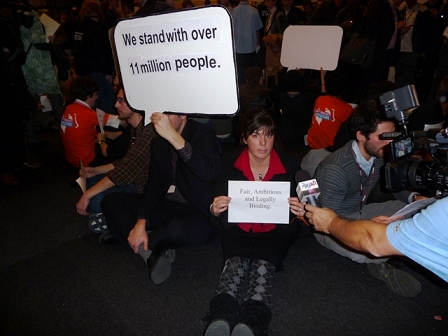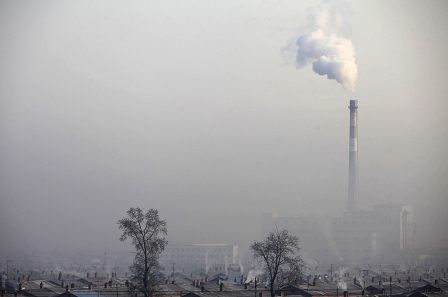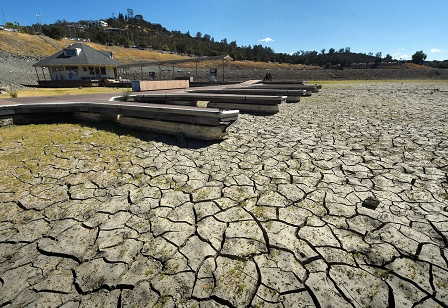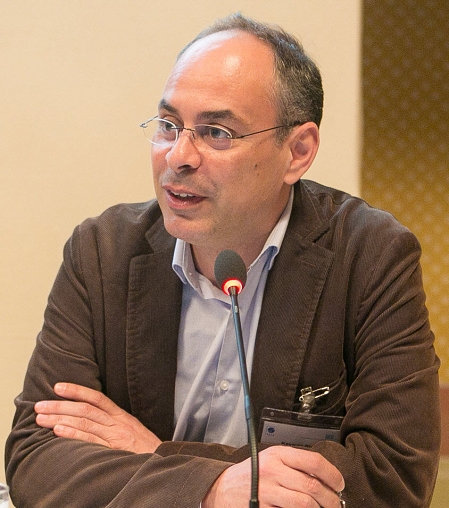Erstellt am: 29. 11. 2015 - 20:30 Uhr
Why Paris Might Succeed Where Copenhagen Failed
COP21
Why Paris Might Succeed Where Copenhagen Failed: Ahead of the Meeting to Save The Planet 2:0 - there is (believe me!) some grounds for optimism.
The last time I went to a conference billed as the meeting that would "save the world", most people left bitterly disappointed. Indeed the train-wreck of the 2009 Copenhagen climate summit, held with 45,000 delegates packed into the vast and echoing Bella Center, left many disillusioned about the international community’s ability to come together and reach a workable agreement to tackle a threat as complex as climate change.
Plenty of Headshaking, No Deal
Copenhagen showed how disunited the world was on a threat that should unite us. The positions between the developed world, of which the US assumed leadership ahead of a fractious and impotent Europe, and the developing world, of which China assumed leadership, were too divergent. There were lots of mutual recriminations, plenty of headshaking, but there was no plan to stop climate change spiralling out of control.
"In Copenhagen," concluded the BBC’s Richard Black, "everyone talked; but no-one really listened."

Chris Cummins
In the end, pen was put to paper. Barack Obama and Chinese head of government Wen Jiabao brokered the so-called Copenhagen accord which "recognised" the scientific case for keeping temperature rises to no more than 2C, but does not contain any specific commitments to emissions reductions to achieve that goal. Even Obama recognized it as a damp squid. Perhaps remembering that during the previous year he had been exclaiming "Yes We Can" to tackling change, he admitted to the press before jetted off back home in Air Force One that "this progress is not enough".
The Copenhagen Post-Mortem
I remembered tramping back to the slowly emptying Bella Center the next day as journalists, analysts and NGOs started the long process of working out what had gone wrong. It was that lengthy Copenhagen post-mortem that led to a change in tactics which has finally resulted in a new surge of optimist that this time, six years on, the global community has matured enough to find a deal at the Paris Climate Summit, the COP21, which begins tomorrow in Paris.
Renowned economist Jeffrey Sachs, who I met in the Tyrolean village of Alpbach recently, told me that the world has finally overcome the "paralysis" that had prevented a deal in Copenhagen. "There has basically been one big breakthrough: For two decades China and the US were basically pointing fingers at one another. That is no longer the case."

IASSA
You’ll remember the story: The USA refused to act to control emissions unless rising power (and rival) China made similar commitments, while China said the onus was on the western powers to act first on account of their historic carbon debt. Basically, and it is hard to dispute the logic of this, western economic dominance was gained on the back of a carbon-fuelled economy that sprung out of the industrial revolution, and now China felt the West was asking it to forgo its chance to follow the same path and "catch up."
"A Desperate Situation"
This paralysis, says Sachs, has led us to "a desperate situation" that has put us in "big trouble". It’s going to be the hottest year since measurements began and "time is running out." It has basically taken six years to recover from the hangover of Copenhagen – a set back that slowed the global response to climate change down.
Dieses Element ist nicht mehr verfügbar
After Copenhagen came less heralded climate conferences in Cancun, Durban, Doha and Lima, and they were stepping stones towards the next major meeting to "save the world" in Paris. My FM4 colleague Barbara Köppel and I will be in the French capital Paris reporting for FM4 at a meeting that politicians and environmental activists agree really can’t afford to fail.

APA/AFP/STR
I can sense your scepticism but Sachs argues that maybe, this time, the hyperbole won’t stick in our throats at deadline day – midnight of the 11th of December. This time there could be a meaningful agreement.
Firstly this is because the mentality has changed among the Chinese leadership. They have seen how vulnerable their own country is to climate change and there is a recognition that as China has become richer and has overtaken the US as the largest global emitter, the populace is becoming increasingly fed up with their coal-choked cities and the leadership recognizes that there is a need and responsibility to act.
"Ordinary Americans have woken up to the threat of climate change"
Meanwhile in the US, says Sachs, and "despite all of the oil money in the United States and the power of the oil companies and what I’d call the corruption of the political system, ordinary Americans have woken up to the threat of climate change."
This, he says, is because of the wave of extreme weather, including drought in California, flooding in the mid-West and hurricanes on the Gulf coast.
According to Sachs, President Obama, has emboldened by this shift in public mood and looks set to push for a strong agreement: "China and the USA this time are both going to sign. Europe has been ready to sign for a long time so that makes three, and I see the rest of the world coming along and deciding that this issue is too big to play games over."

APA/AFP/MARK RALSTON
The difference between Copenhagen and Paris could also be a shift from top-down targets to bottom-up consensus building says Keywan Riahi, Program Director for Energy at IIASA’s magnificent imperial-era palace just outside Vienna. In the lead up to the Paris meetings, countries have announced the voluntarily contributions that they are willing to make to combat global climate change, based on their own national circumstances. These are called Intended Nationally Determined Contributions, or INDCs. The system is a bit like one of those restaurants that ask you to pay whatever you feel like.
Bottom Up, Rather Than Top Down
"We learned from the failure of Copenhagen that given the different circumstances of different countries, it is impossible to find a top-down approach." Even if we were able to put aside the aforementioned thorny issue of historical responsibility, in many countries the fact remains that poverty, hunger, development and economic growth are simply a bigger immediate priority than tackling climate change. "Aligning these different interests in one over-arching umbrella in an over-arching umbrella - a command and control way – failed," says Riahi.
So now we’re trying the INDCs. Examples of these commitments include the United States' intention to reduce emissions in 2025 by 26-28% of 2005 levels, the EU’s vow to reduce its emissions in 2030 by 40% of 1990 levels, and China's pledge to peak emissions by 2030 and increase its share of non-fossil fuels. India, the world’s third largest emitter, has a formula for cutting "emissions intensity per unit GDP" to reflect what it sees as its priority to deal with poverty.
"The countries will stand by these pledges because they have come from their own national decision making processes," says IASSA’s Riahi. "Through that the chance that you have an agreement is of course much bigger."

Matthias Silveri / IIASA
"We Let All Countries Do What They Want"
It’s about getting everyone on board, moving in the same direction and not worrying, for the moment, too much about the speed of travel. "In Copenhagen we tried to impose a global system on all countries. Now we let all countries do what they want and then we try and figure out what it all adds up to," says Riahi’s IIASA colleague Joeri Rogelj.
The problem is that they don’t really add up to much. The pledges already received won’t keep the global temperature rises to below the 2 degree limit that would avoid what scientists have called "catastrophic climate change" (a 1.5 degree target was quietly scrapped at Copenhagen). And there is no mechanism to keep the countries to the promise apart from what Joeri Rogelj suggests will be a peer pressure of shaming and blaming laggards.
"It's a Start In a Long Process"
But isn’t this all a bit fragmented and vague to bet our planet’s survival on? It seems to me like allowing school children to set their own homework. "We know that they will fall short but it is a commitment from all the countries. It is a start. It is the first step in a long process," says Riahi. There is a clear risk that, given the pressing nature of the problem, the targets will likely lack the necessary ambition?
"That’s definitely a danger," admits Rogelj, "and that’s why one of the main tasks of the Paris negotiations will be to provide a robust accounting framework where emissions and actions can be compared between countries so that we know where we are headed."


